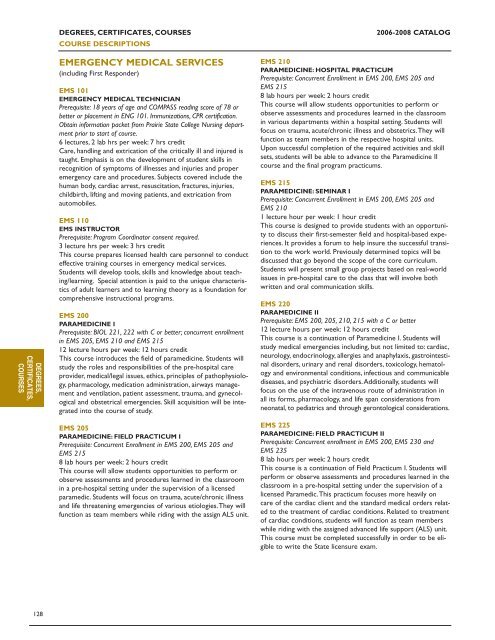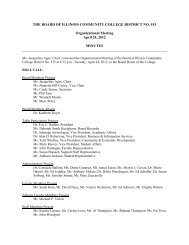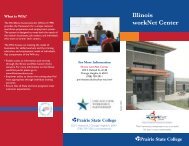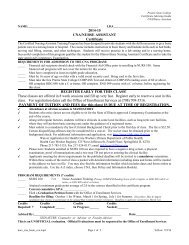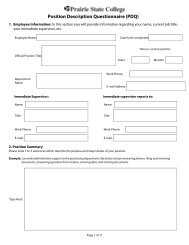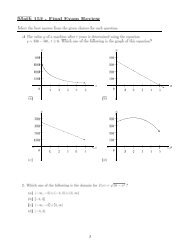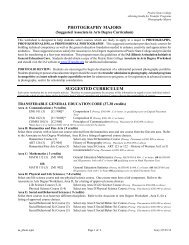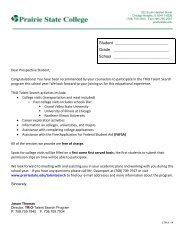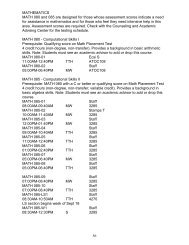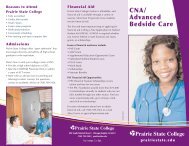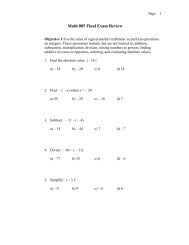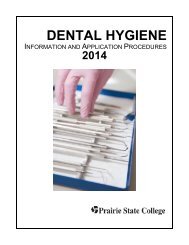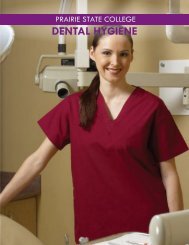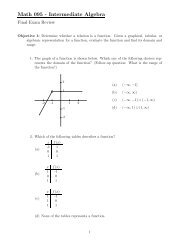catalog - Prairie State College
catalog - Prairie State College
catalog - Prairie State College
- No tags were found...
Create successful ePaper yourself
Turn your PDF publications into a flip-book with our unique Google optimized e-Paper software.
DEGREES,CERTIFICATES,COURSESDEGREES, CERTIFICATES, COURSESCOURSE DESCRIPTIONSEMERGENCY MEDICAL SERVICES(including First Responder)EMS 101EMERGENCY MEDICAL TECHNICIANPrerequisite: 18 years of age and COMPASS reading score of 78 orbetter or placement in ENG 101. Immunizations, CPR certification.Obtain information packet from <strong>Prairie</strong> <strong>State</strong> <strong>College</strong> Nursing departmentprior to start of course.6 lectures, 2 lab hrs per week: 7 hrs creditCare, handling and extrication of the critically ill and injured istaught. Emphasis is on the development of student skills inrecognition of symptoms of illnesses and injuries and properemergency care and procedures. Subjects covered include thehuman body, cardiac arrest, resuscitation, fractures, injuries,childbirth, lifting and moving patients, and extrication fromautomobiles.EMS 110EMS INSTRUCTORPrerequisite: Program Coordinator consent required.3 lecture hrs per week: 3 hrs creditThis course prepares licensed health care personnel to conducteffective training courses in emergency medical services.Students will develop tools, skills and knowledge about teaching/learning.Special attention is paid to the unique characteristicsof adult learners and to learning theory as a foundation forcomprehensive instructional programs.EMS 200PARAMEDICINE IPrerequisite: BIOL 221, 222 with C or better; concurrent enrollmentin EMS 205, EMS 210 and EMS 21512 lecture hours per week: 12 hours creditThis course introduces the field of paramedicine. Students willstudy the roles and responsibilities of the pre-hospital careprovider, medical/legal issues, ethics, principles of pathophysiology,pharmacology, medication administration, airways managementand ventilation, patient assessment, trauma, and gynecologicaland obstetrical emergencies. Skill acquisition will be integratedinto the course of study.EMS 205PARAMEDICINE: FIELD PRACTICUM IPrerequisite: Concurrent Enrollment in EMS 200, EMS 205 andEMS 2158 lab hours per week: 2 hours creditThis course will allow students opportunities to perform orobserve assessments and procedures learned in the classroomin a pre-hospital setting under the supervision of a licensedparamedic. Students will focus on trauma, acute/chronic illnessand life threatening emergencies of various etiologies.They willfunction as team members while riding with the assign ALS unit.2006-2008 CATALOGEMS 210PARAMEDICINE: HOSPITAL PRACTICUMPrerequisite: Concurrent Enrollment in EMS 200, EMS 205 andEMS 2158 lab hours per week: 2 hours creditThis course will allow students opportunities to perform orobserve assessments and procedures learned in the classroomin various departments within a hospital setting. Students willfocus on trauma, acute/chronic illness and obstetrics.They willfunction as team members in the respective hospital units.Upon successful completion of the required activities and skillsets, students will be able to advance to the Paramedicine IIcourse and the final program practicums.EMS 215PARAMEDICINE: SEMINAR IPrerequisite: Concurrent Enrollment in EMS 200, EMS 205 andEMS 2101 lecture hour per week: 1 hour creditThis course is designed to provide students with an opportunityto discuss their first-semester field and hospital-based experiences.It provides a forum to help insure the successful transitionto the work world. Previously determined topics will bediscussed that go beyond the scope of the core curriculum.Students will present small group projects based on real-worldissues in pre-hospital care to the class that will involve bothwritten and oral communication skills.EMS 220PARAMEDICINE IIPrerequisite: EMS 200, 205, 210, 215 with a C or better12 lecture hours per week: 12 hours creditThis course is a continuation of Paramedicine I. Students willstudy medical emergencies including, but not limited to: cardiac,neurology, endocrinology, allergies and anaphylaxis, gastrointestinaldisorders, urinary and renal disorders, toxicology, hematologyand environmental conditions, infectious and communicablediseases, and psychiatric disorders.Additionally, students willfocus on the use of the intravenous route of administration inall its forms, pharmacology, and life span considerations fromneonatal, to pediatrics and through gerontological considerations.EMS 225PARAMEDICINE: FIELD PRACTICUM IIPrerequisite: Concurrent enrollment in EMS 200, EMS 230 andEMS 2358 lab hours per week: 2 hours creditThis course is a continuation of Field Practicum I. Students willperform or observe assessments and procedures learned in theclassroom in a pre-hospital setting under the supervision of alicensed Paramedic.This practicum focuses more heavily oncare of the cardiac client and the standard medical orders relatedto the treatment of cardiac conditions. Related to treatmentof cardiac conditions, students will function as team memberswhile riding with the assigned advanced life support (ALS) unit.This course must be completed successfully in order to be eligibleto write the <strong>State</strong> licensure exam.128


